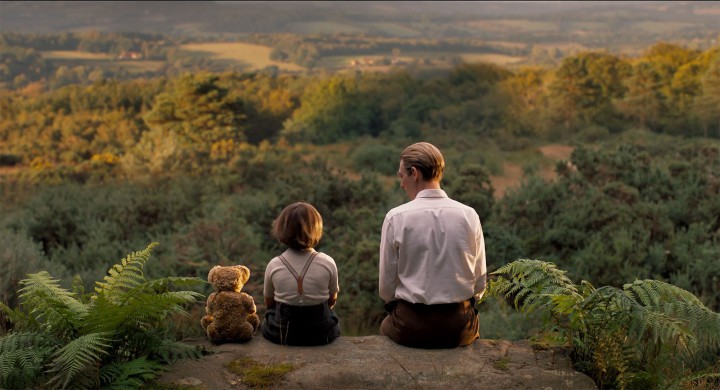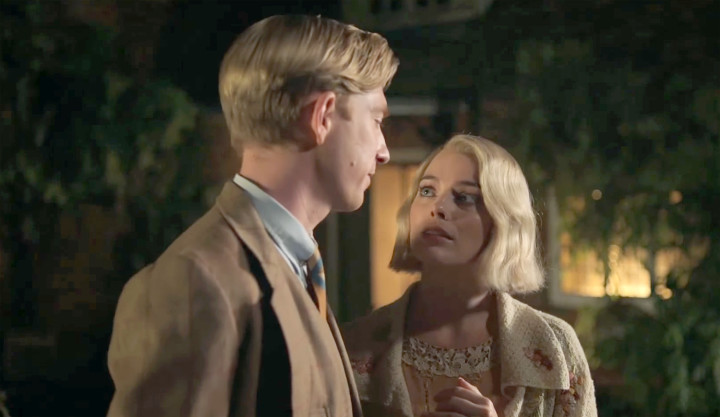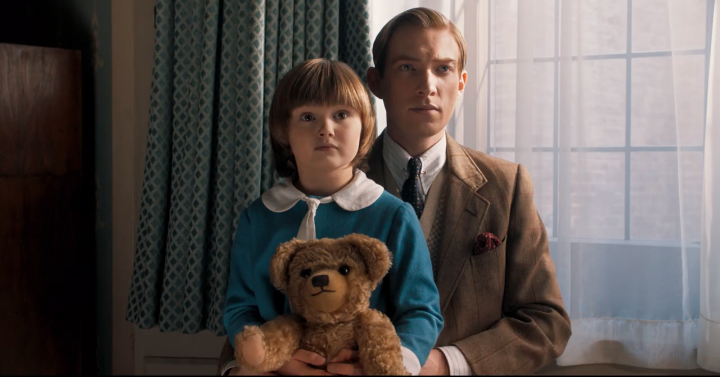As someone who has largely taken Winnie-the-Pooh for granted, Goodbye Christopher Robin bordered on revelatory. While too often superficial and on-the-nose, there is enough background insight into the creation of the iconic children’s books for the film to carry both narrative and historic weight, even if it feels occasionally slight and oversimplified. But be forewarned — this is a film about PTSD and the social consequence of war just as much as it is a story about the most famous teddy bear in the world. It’s not the most compelling biopic out there, nor is it the best film about the creative process or the sharpest criticism of warfare — but if the whole is less than the sum of its parts, Goodbye still has enough going for it to warrant a qualified recommendation.
Narratively, the film follows Pooh creator A.A. Milne immediately following his service in WWI, recounting the difficulties he encountered reintegrating into polite society. We see his career as a playwright fizzle, his wife chafe under the burden of his postwar malaise and the birth of his son Billy Moon (née Christopher Robin) as an alien and somewhat unwelcome presence. The bulk of the story takes place in the English countryside, where Milne drags his young family in a desperate attempt to escape his PTSD — a strategy that obviously doesn’t pan out. When his wife leaves indefinitely and the nanny has to return home, Milne appears to create the Pooh stories out of the necessity inherent to his role as sole caregiver.
The film’s structural conceit is something of a double-edged sword, with a contrived flash-forward framing device serving a purpose that I assume functioned more effectively at the script level than in the finished product. Rooting the film’s conflict in Milne’s WWI flashbacks works in that it underscores the duality of his post-war experience, grounding his creation of a beloved children’s character in a very personal struggle with deep and unremitting psychological wounds. The pitfall of this approach is that those coming to the film with no foreknowledge of Milne’s history may well be shocked by the degree to which the author’s difficult backstory may have influenced the creation of a seemingly frivolous kiddie story — and the extent to which the damage incurred by the English nation’s collective unconscious left it primed to embrace such a work.
Domhnall Gleason does a commendable job of conveying Milne’s inner turmoil, reacting to PTSD-inspired hallucinations with the sort of visceral apprehension that such experiences might entail without hamming up the more dramatic aspects of the process. Margot Robbie, on the other hand, overplays her role as the ostensible villain of the piece in her turn as Milne’s party-girl wife, crossing the boundary from relatable to reprehensible early and with little subtlety. The always welcome Kelly MacDonald is a bright spot as the sole person in the film who seems to have any sort of emotional warmth, but she’s given far too little to work with for her presence to rectify the film’s tendency toward shallow characterization.
Ultimately, director Simon Curtis was ill-suited to delivering a nuanced portrayal of his subject, yet his depiction of Milne’s process is not without its charms. Had his grasp of narrative temporality or character development been stronger, there might have been the potential for Goodbye to be a poignant meditation on the lost innocence of a culture and one author’s indelible efforts to reclaim it — but as it stands, it’s mostly Pooh. Rated PG for thematic elements, some bullying, war images and brief language. Now Playing at Fine Arts Theatre.









Before you comment
The comments section is here to provide a platform for civil dialogue on the issues we face together as a local community. Xpress is committed to offering this platform for all voices, but when the tone of the discussion gets nasty or strays off topic, we believe many people choose not to participate. Xpress editors are determined to moderate comments to ensure a constructive interchange is maintained. All comments judged not to be in keeping with the spirit of civil discourse will be removed and repeat violators will be banned. See here for our terms of service. Thank you for being part of this effort to promote respectful discussion.